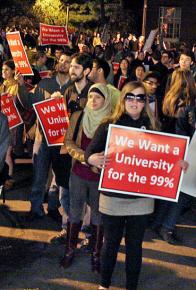Harvard is under occupation
Occupy Harvard has established an encampment in Harvard Yard--and activists plan to take up campus issues as well as broader ones, reports .
THE OCCUPY movement came to Harvard University this week, and it came in loud.
More than 500 people marched as part of Occupy Harvard, which was launched on November 9. The action began when a gathering of 70 or so students in Harvard Yard marched beyond the gates of the campus into Harvard Square, swelling to hundreds along the way. The march took over and shut down Massachusetts Avenue, one of Boston and Cambridge's major arteries.
Under the slogan "We want a university for the 99 percent, not a corporation for the 1 percent," Harvard students and employees, and other activists from Occupy Boston, marched back toward the heart of campus to set up an encampment in the Yard.
The Harvard Police Department and private university security guards used chains and padlocks to lock every gate to Harvard Yard, keeping protesters out and temporarily trapping resident students inside.
When Occupy Boston activists heard about the standoff with police, many came from around the city to join the action. Much of the night involved protesters marching to each gate, trying to get inside, retreating to the un-walled Law School campus, and marching back to the Yard. Eventually, dozens of students got into the yard with their student IDs and set up camp, which remains as this article was being written.

According to the Harvard Crimson:
At about 10:30 p.m., roughly 120 demonstrators--mostly Harvard students--linked arms and created a circle in front of the John Harvard Statue, within which they began to assemble the tents. As the protesters were constructing their tent city, [Dean of Student Life Suzy] Nelson emerged and attempted to convince the occupiers to move the tents to Tercentenary Theatre, where they would be less disruptive. Protesters rejected her suggestion, but said they would consider relocating the tents if they become too troublesome.
The Harvard administration issued a statement to the "Harvard Community" that attempted to stoke fears of the threat "outsiders" posed to campus:
The events of last night raised safety concerns: the number of demonstrators was large, many of the demonstrators were not from Harvard, and specific behaviors were troubling. For this reason, the university took what we consider to be appropriate security precautions as the situation evolved during the evening.
But locking down Harvard Yard is nearly unprecedented. According to Harvard senior Dylan Matthews writing at Salon.com:
It's worth noting that in the history of Harvard protests, such a lockdown of the yard is very rare. The only precedent is the 1969 Vietnam protests, in which a group of 30 students, later swelling to 500, took over University Hall, expelling administrators, and picking up and carrying out associate dean Archie Epps when he wouldn't leave voluntarily...Then, Harvard locked down the yard, and called in state and local police to force the occupiers out.
In the Crimson, Matthews suggested that the university strategy of locking down the Yard, which creates lines of students, faculty and staff who must present IDs to enter campus, is:
a very savvy means of turning students against protesters, but the occupiers aren't the ones blocking gates. The administration is doing that, and can stop at any time. The occupiers are doing nothing more than making our voices heard, one tent at a time.
HARVARD'S REACH extends throughout Boston, with several campuses, hospitals and many other properties--and, of course, its ideological reach extends around the world through its journals that inform its powerful alumni and the 1 percent that many Harvard students come from and/or aspire to join.
According to Occupy Harvard's website, that's why an Occupy encampment is essential:
As students, many of whom pay tuition, we have a right to know where our money is being invested. Since Harvard represents us and is a nonprofit organization dedicated to the public good, we are sad to learn about investments in hotel chains that mistreat workers, extraction companies that devastate the American landscape with mountaintop removal, and hedge funds that displace farmers in developing countries.
Closing Harvard Yard off from the outside world only serves to further insulate Harvard from the realities faced by the 99 percent. Undeterred, Harvard students are camping and meeting to discuss how to get more students and staff at Harvard involved and how to integrate more with the broader Occupy Boston movement.
"Harvard is a school at the economic and political center of the 1 percent," said Neil Peterman, a graduate student in physics. "Occupy Harvard is students and others standing against that. We're bringing the Occupy movement to Harvard."


